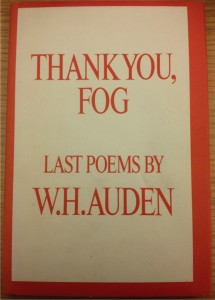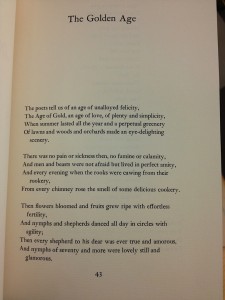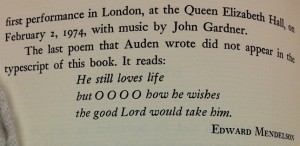[Posted by Madeline Burns ‘16, for Prof. David Rosen’s course, “Modern Poetry”]
 What I found in the Watkinson was Thank You, Fog, a posthumous collection of poetry by W. H. Auden, published in 1974. The poems in this collection were written in 1972 and 1973, up until Auden’s death in September 1973. At the time of his death, Auden had already assembled the poems he wanted to be in this book, and had selected its title and dedication. He was preparing it for publication by his literary executor Edward Mendelson.
What I found in the Watkinson was Thank You, Fog, a posthumous collection of poetry by W. H. Auden, published in 1974. The poems in this collection were written in 1972 and 1973, up until Auden’s death in September 1973. At the time of his death, Auden had already assembled the poems he wanted to be in this book, and had selected its title and dedication. He was preparing it for publication by his literary executor Edward Mendelson.
The main reason that I selected this collection was because of Edward Mendelson’s commentary. In a note at the beginning of the collection, Edward Mendelson writes that the last poem that Auden wrote did not appear in this collection. He includes the poem at the end of his note. It reads:
He still loves life
but O O O O how he wishes
the good Lord would take him.
Mendelson’s commentary and the inclusion of Auden’s last poem ever written provides insight into the end of Auden’s life and how his poetry progressed over the span of his lifetime. Auden wrote about old age, and death, and coming to terms with old age and death. You can also see his religious influences more prominently than in some of his earlier poems. Especially in this final poem that Mendelson included, Auden came to accept his death and wished that “the good Lord would take him”.
Auden is typically considered to be an anti-romantic. He presents the world in a scientific manner, and writes in a orderly, neat writing style. His earlier poems are rooted in concrete images and colloquial language. While his style certainly carries over into his last collection, his ideas are more romanticized and abstract than in his earlier collections. The presentation of his poems was also different from that in some of his earlier works. His stanza alignment was more abstract, with many indented passages within larger poems, and asterisks breaking up stanzas.
 These poems were written during his short time in Europe before his death. He died in Austria in 1973, not in the United States, although he gained American citizenship in the 1940s. Some of his best work comes from the stretch of time that he was living in the United States. Was this elevated point in his writing career exemplary of the profound influence of his environment, or was it merely a combination of his age and skill at the time. This comes into question when looking at this later collection of poetry, written in Europe. Was the more abstract and pensive writing style primarily the result of his old age, or his environment?
These poems were written during his short time in Europe before his death. He died in Austria in 1973, not in the United States, although he gained American citizenship in the 1940s. Some of his best work comes from the stretch of time that he was living in the United States. Was this elevated point in his writing career exemplary of the profound influence of his environment, or was it merely a combination of his age and skill at the time. This comes into question when looking at this later collection of poetry, written in Europe. Was the more abstract and pensive writing style primarily the result of his old age, or his environment?
One also has to question how much of these changes came directly from Auden, and how much came from Mendelson after Auden’s death. When looking at a posthumous collection of poems, one can never be sure what the author’s original intentions were. For instance, part of what caught my attention about this collection was its color – the cover is orange. Did Auden intend for it to be that color? Or were his directions not that specific, and did Mendelson have to make these decisions himself? Also, were all the poems included in this collection meant for publication? Auden did not want his last poem to be included in the collection, and yet Mendelson includes it in his introduction. Even with the most talented of poets, in a posthumous collection, not everything is worthy of release, even when in a fully completed form. As a collection of poetry, Thank You, Fog is not Auden’s strongest work. However, its existence stands as a testament to his life’s journey as a poet, and the ways in which his writing style developed over time.
